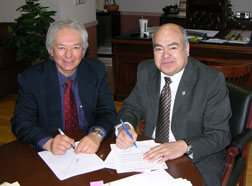 USIBWC Mexican Commissioner Arturo Herrera (left) and U.S. Commissioner Carlos Marin of the International Boundary and Water Commission. |
In the wake of the tragic loss of its two leaders last month, the International Boundary and Water Commission is searching for ways to move forward. Last month the agency’s U.S. Commissioner Carlos Marin and Mexican Commissioner Arturo Herrera were killed when the charter plane they were in crashed in the Sierra Madre mountains of Mexico.
The officials were conducting an aerial survey as part of the joint US-Mexican effort to respond to flood conditions in the Rio Grande basin. Two others on board, the Executive Director of the Rio Grande Council of Governments, Jake Brisbin, Jr., and the pilot, Matthew Peter Juneau, were also killed in the crash.
|
“The deaths of Commissioners Marin and Herrera are a tremendous loss to the Commission,” said acting Commissioner Al Riera. “Both Commissioners were experts in their field whose knowledge gained over their decades of work for the Commission is irreplaceable. They also had the trust and respect of stakeholders on both sides of the border which was invaluable in resolving the many transboundary issues the Commission faces on a daily basis.”
The agency deals transboundary issues along the U.S.-Mexico border that include flood control, sanitation, boundary demarcation and mapping.
On Sept. 15, the plane - a propeller-driven, chartered Cessna 421 - carrying the two men took off from El Paso International Airport on a charter flight to Presidio, Texas. The flight included a flyover of the Luis Leon Dam in Mexico as part of the response to the Rio Grand flooding last month.
 USIBWC The Nogales International Wastewater Treatment plant during construction in 2007. |
The NTSB, which is assisting the Mexican agency, said the plane collided with mountainous terrain approximately 100-150 feet below the top of a ridgeline on the west side of the Sierra Grande Mountains. The pilot filed a visual flight rules flight plan but was advised by the Fort Worth Automated Flight Service Station that visual flight rules were not recommended due to mountain obscuration.
Due to the remote location of the wreck - 23 miles northwest of Presidio and 13 miles from the banks of the Rio Grande River - rescuers took two days to locate the crash site.
The exact cause of the crash is still under investigation by the Direccion General de Aeronautica Civil in Mexico.
Marin was appointed commissioner by President Bush in December 2006. He had previously served at the agency for almost three decades including stints as served previously as Deputy Commissioner and Principal Engineer of the Operations Department.
“Carlos Marin was an accomplished engineer and capable leader who achieved the American dream while serving at the Commission for over two decades,” said President Bush in a statement immediately after the crash. “He quickly rose through the ranks as he worked hard to effectively apply the boundary and water treaties between our country and Mexico.”
The U.S. agency has planned a memorial service for Commissioner Marin on Friday at the Chamizal National Memorial in El Paso, Texas.
Commissioner Arturo Herrera was named to head the Mexican aspect of the agency in 1989. During his quarter-century of work with the commission, he held posts as the head of the Tijuana, Baja California office, Secretary, and Principal Engineer of the Mexican Section.
 USIBWC The Nogales International Wastewater Treatment plant during construction in 2007. |
The tragedy comes as the commission is working on several major projects as well as conducting efforts to stem the impact of recent flooding in the Rio Grande river basin.
Last month, the Rio Grande experienced extensive flooding due heavy inflows from reservoirs inside Mexico as a result of storms. The situation became critical when the levee near Presidio gave way, forcing the commission into emergency operations.
Dozens of U.S. Section personnel from different field offices deployed to Presidio to conduct flood fighting operations and shore up the U.S. levees, Riera said.
The river remains above flood stage and while the water surface is well below the top of the levee, structural problems such as levee seepage and sand boils persist. The Luis Leon Dam is slated to continue releasing overflow as part of the flood operations until next week.
Once flood conditions subside and conditions permit, the commission will undertake emergency repairs on the levee segments that failed during the flood, officials said. Long-term improvements to the Presidio Flood Control Project are also under way.
The commissioners were instrumental in progress on a pair of major border water sanitation projects: The South Bay International Wastewater Treatment Plant and The Nogales International Wastewater Treatment Plant.
Last month, the commission solicited bids for the construction of a new $101.5-million facility adjacent to existing South Bay plant facility located in California’s San Diego County near San Ysidro. The existing $240-million plant was completed in the late 1990s is capable of processing 25 million gallons per day. The upgrade is slated for completion by January 2011.
Work on a $62.5-million upgrade to the Nogales facility is slated for completion by the end of 2009. Located in Arizona’s Santa Cruz County, the plant serves almost 400,000 residents in the Nogales, Arizona, Nogales, Sonora and the Rio Rico area. The improvement project will enhance the secondary treatment in order to meet regulatory standards and increase the facility’s capacity to 14.74 million gallons per day.
“Undoubtedly, the leadership and corporate knowledge of both Commissioners will be missed on Colorado River issues and other important diplomatic work,” Riera said. “After working so many years with Commissioners Marin and Herrera, it will be an adjustment for some stakeholders to adapt to new leadership and build trust.’
 Related Links:
Related Links: 
